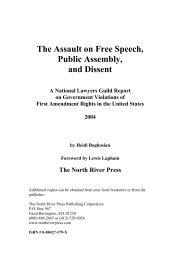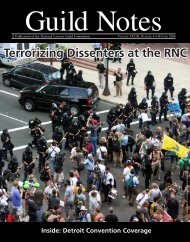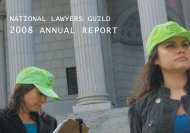Does your library have National Lawyers Guild Review?
Does your library have National Lawyers Guild Review?
Does your library have National Lawyers Guild Review?
Create successful ePaper yourself
Turn your PDF publications into a flip-book with our unique Google optimized e-Paper software.
editor’s preface continuedFor this a meaningful investigation is required and, if one of those valuesis going to continue to be the rule of law, prosecutions must occur when thefacts compel them. Professor Marjorie Cohn, immediate past <strong>Guild</strong> Presidentwas correct in her 2008 testimony before the House Subcommittee onthe Constitution, Civil Rights and Civil Liberties, that torture is, along withgenocide, slavery, and aggressive war, a violation of jus cogens, the highestand most basic species of international law. 2 Professor Cohn’s completestatement to the House Subcommittee is included in this issue.When it comes to issues fundamental to the moral and political identityof a nation, like what to do with those who <strong>have</strong> contorted America’s foundingcharter, the Constitution, to allow for war crimes and torture, the U.S.cannot “right its course” without first dealing rightly with those who <strong>have</strong>perpetrated such bold and terrible wrongs. And we cannot “move forwardwith confidence” when failing to redress these wrongs makes plain to theworld that our core values are still an open question. With the next featurein this issue, “U.S. War Crimes: Torture as Official Bush AdministrationPolicy,” <strong>Guild</strong> member and Utah Valley University Professor Alan Clarkecontinues this law review’s effort to understand the origin, details and legalramifications of U.S. interrogation policy during the “war on terror.”After decades of rancorous and often violent labor disputes and in themidst of the Great Depression, in 1935 congress passed the <strong>National</strong> LaborRelations Act. The new law was meant to redefine the relationship betweenworkers and management, confirming and codifying the rights of workers toorganize and bargain collectively with their employers. It was at the time seenas a watershed moment in the history of workers’ rights. Seventy-five yearslater, with union-allergic Wal-Mart as America’s largest private employer,and our political discourse dominated by thoroughly corporatized news mediathat gives little attention to the values of organized labor, the struggle tobring anything like genuine democracy to the American workplace remainsdaunting and, for workers seeking to vindicate their rights, is often paid forat great personal cost. In the next feature, “Organizing—With or Without theNLRB,” labor attorney Henry M. Willis reflects on the unfulfilled promiseof the NLRA.—Nathan Goetting, editor-in-chief_______________NOTES1. Dahlia Lithwick, Over It, Slate, Apr. 17, 2009, at http://www.slate.com/id/2216323.2. Congressional Testimony of Marjorie Cohn on Torture Policy, available at http://www.marjoriecohn.com/2008/05/congressional-testimony-of-marjorie.html (May6, 2008, 22:56 EST).


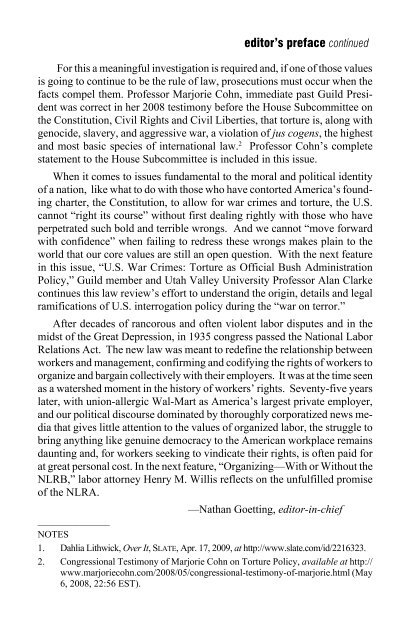
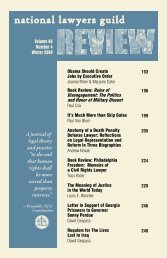

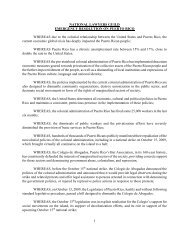
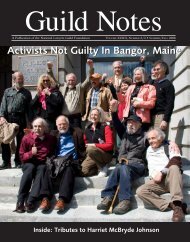
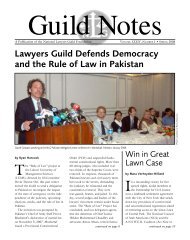
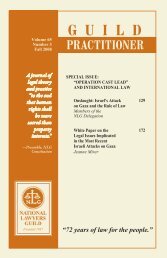

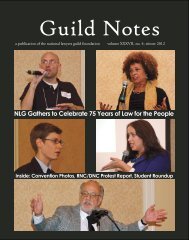
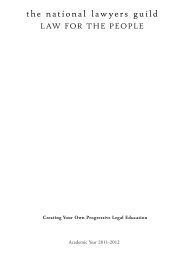
![NLGRev 68-2[1].indd - National Lawyers Guild](https://img.yumpu.com/30820772/1/167x260/nlgrev-68-21indd-national-lawyers-guild.jpg?quality=85)
